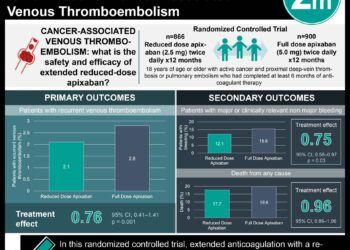Pre-hospital plasma transfusion in patients at risk of hemorrhagic shock decreases mortality
1. In patients at risk of hemorrhagic shock, the pre-hospital administration of thawed plasma decreased mortality at 24 hours and 30 days and patients had a lower median PTT, compared to standard-care resuscitation.
2. Thawed plasma administration showed no significant difference compared to standard-care resuscitation with respect to multi-organ failure, acute lung injury, acute respiratory distress syndrome, nosocomial infection, or allergic/transfusion-related reaction.
Evidence Rating Level: 1 (Excellent)
Study Rundown: An important priority in managing trauma patients is to prevent coagulopathy, irreversible shock, and the inflammatory cascade by administering blood products over crystalloids during resuscitation. Prior studies have suggested plasma transfusion is advantageous, but the risks in the pre-hospital environment are unknown. This multicenter, cluster-randomized, phase 3 trial controlled trial involved injured patients who were at risk of hemorrhagic shock and compared patients in into plasma transfusion and standard-care resuscitation groups. The trial occurred in the pre-hospital setting. Mortality at 24 hours and 30 days, and median prothrombin time were significantly lower in the plasma group compared to the standard-care group. There was no significant difference in multi-organ failure, acute lung injury, acute respiratory distress syndrome, nosocomial infection, or allergic/transfusion-related reaction between the two groups. The major strengths of this study were its pragmatic nature (simple inclusion criteria based on vital signs), diverse patient study population in the trial, and the small volume of pre-hospital plasma needed to show benefit. The main limitations of the trial were its cluster design (though needed given the short half-life of plasma), imbalanced randomization, and inability to mask the intervention.
Click to read the study in NEJM
Relevant Reading: Transfusion of plasma, platelets, and red blood cells in a 1:1:1 vs a 1:1:2 ratio and mortality in patients with severe trauma
In-Depth [randomized controlled trial]: This study aimed to determine the efficacy and safety for pre-hospital administration of thawed plasma in injured patients at risk of hemorrhagic shock. A pragmatic, multi-centered, phase 3 superiority trial compared thawed plasma administration versus standard-care resuscitation during air medical transport. The primary outcome was 30-day mortality.
From May 2014 to October 2017, 7275 patients were air transported from 27 air medical bases to 9 trauma centers. Ultimately, 501 patients were included in the study with 230 receiving plasma and 271 receiving standard care-resuscitation. Mortality at 30 days was 23.2% in the thawed plasma group compared to 33% in the standard group (difference of -9.8%; 95% confidence interval [CI], -18.6% to -1%; P=0.03). Mortality at 24 hours (difference of -8.2%; 95% CI, -14.9% to -1.6; P=0.02) and in-hospital mortality (difference of -10.3%, 95% CI, -18% to -2.6%; P=0.01) were lower in the plasma group compared to the standard-care group. There were no documented cases of lung injury related to transfusion. There were 5 patients (2.2%) in the plasma group who had a transfusion related reaction, while 1 patients (0.4%) had a similar reaction in the standard care group. A total of 10 patients had an adverse event in the plasma group, of which 3 were considered serious (1 in the plasma group, 2 in the standard group).
Image: PD
©2018 2 Minute Medicine, Inc. All rights reserved. No works may be reproduced without expressed written consent from 2 Minute Medicine, Inc. Inquire about licensing here. No article should be construed as medical advice and is not intended as such by the authors or by 2 Minute Medicine, Inc.






![Endostatin directly binds androgen receptors to treat prostate cancer [PreClinical]](https://www.2minutemedicine.com/wp-content/uploads/2015/01/Endostatin-75x75.jpeg)
